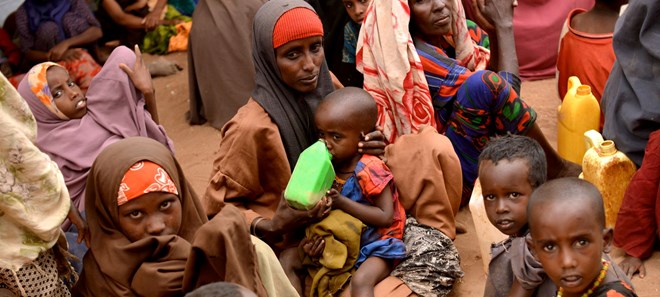Somalia on list of countries with worst food crisis –UN report

A 2018 global report on food crises by the United Nations has listed Somalia as one of the four countries that experienced the worst food crises.
Together with Somalia in the list are Nigeria, Yemen, and South Sudan.
According to the report, around 124 million people in 51 countries face food insecurity.
These countries require urgent humanitarian action to save lives, protect livelihoods, and reduce hunger and malnutrition.
“Around 124 million people in 51 countries face food insecurity. They require urgent humanitarian action to save lives, protect livelihoods, and reduce hunger and malnutrition.
“The worst food crises in 2017 were in Somalia, north-eastern Nigeria, Yemen, and South Sudan, where nearly 32 million people were food-insecure and in need of urgent assistance. Famine was declared in two counties of South Sudan in February 2017.
“Although humanitarian assistance has thus far contributed towards preventing large-scale famines, humanitarian needs remain exceptionally high across the four countries,” the report reads partly.
The report recorded an increase in the figure from the 2017 report with an additional 16 million people in the crises food security zone.
The rise was linked to ‘intensified and protracted conflict or insecurity’.
“Last year’s Global Report on Food Crises identified 108 million people in crisis food security or worse across 48 countries.
“A comparison of the 45 countries included in both editions of the Global Report on Food Crises reveals an increase of 11 million people – an 11 percent rise – in the number of food-insecure people needing urgent humanitarian action across the world.
“This rise can largely be attributed to new or intensified and protracted conflict or insecurity in countries such as Somalia, Yemen, northern Nigeria, the Democratic Republic of Congo, South Sudan, and Myanmar. Persistent drought has also played a major role, causing consecutive poor harvests in countries already facing high levels of food insecurity in eastern and southern Africa,” the report added.
It was predicted that the situation could further deepen if conflict and a high level of insecurity continue in the affected countries.
It stated, “Conflict and insecurity will likely remain major drivers of food security crises in 2018, affecting Afghanistan, Central African Republic, the Democratic Republic of Congo, north-east Nigeria, and the Lake Chad region, South Sudan, Syria, and Yemen as well as Libya and the central Sahel (Mali and Niger).
“The impact of severe dry weather on crop and livestock production is likely to heighten food insecurity in pastoral areas of Somalia, south-eastern Ethiopia and eastern Kenya, and in West Africa and the Sahel in Senegal, Chad, Niger, Mali, Mauritania, and Burkina Faso.”
The UN noted that no significant improvement in food security would be expected globally until peace is achieved and livelihoods restored while mentioning that “food security, nutrition, and livelihoods-based interventions will be vital to save lives, build resilience and contribute to sustaining peace”.
The countries listed as worst-hit are Yemen, Afghanistan, Democratic Republic of Congo, South Sudan, Ethiopia, Syria, North Nigeria, Sudan, Somalia, Kenya, Uganda, Burundi, Madagascar, Haiti, Central African Republic, Malawi, Iraq, Palestine, Cameroon, Ukraine (Donetsk and Luhansk oblasts), Bangladesh, Zimbabwe, Mozambique, Chad, Niger, Mali, Burkina Faso, Mauritania, Senegal, Libya, Lesotho, Swaziland, Guatemala, Tanzania, Sierra Leone, Guinea, Liberia, Gambia,Guinea-Bissau, Djibouti, Honduras, Nicaragua, Zambia, El Salvador, Democratic People’s Republic of Korea, Myanmar, Pakistan, Eritrea and Venezuela.